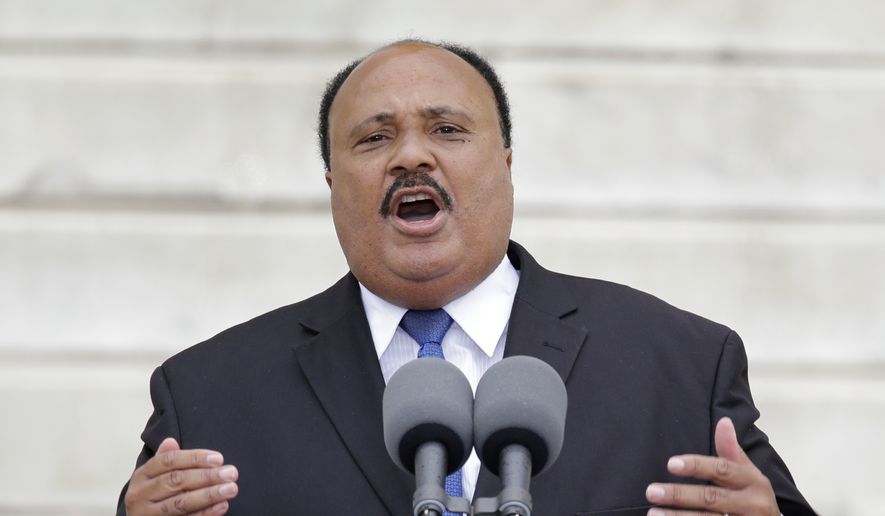NEWSMAKER INTERVIEW:
On the holiday commemorating his father’s epic civil rights legacy, Martin Luther King III says he is dismayed by recent violence against police, the destructive protests in Ferguson and the trashing of a U.Va. fraternity falsely accused of sexual assault because they don’t reflect his father’s own approach to advocate for change peacefully.
He also warns that unchecked fervor that tries to justify violent means of achieving the goal of equality could set back the movement his father started.
“My father’s approach to the most brutal and unambiguous social injustices during the civil rights struggle was rooted in nonviolence as a morally and tactically correct response,” Mr. King said in an interview with The Washington Times. “In no way do I, nor would my father, condone any ’ends justify the means’ behavior.”
But recent riots in Ferguson, Missouri, the vengeance killing of two police officers in New York and campus violence at the University of Virginia have proved that 47 years after the peace activist was assassinated, his message still has not resonated with some.
Shortly after Missouri prosecutors announced that they would not file charges against Darren Wilson for the fatal shooting of Michael Brown, gunshots were fired and businesses were set ablaze in Ferguson, leaving seven citizens and four police officers injured.
SEE ALSO: Martin Luther King Jr.’s children fight in court for father’s Bible, Nobel Prize
In Brooklyn, a wave of hostile protests against police sparked fury throughout the city, culminating in the cold-blooded killings of two New York Police Department officers, an act ostensibly designed to avenge Mr. Brown and New Yorker Eric Garner.
In late November, undergraduate students at Charlottesville’s University of Virginia resorted to hurling bricks, bottles and concrete blocks through windows at the Phi Kappa Psi fraternity residence after Rolling Stone magazine recklessly accused the house of orchestrating a brutal gang rape. Profane, anti-male epithets were spray-painted across the fraternity’s Colonial brick exterior, and threats of continued violence were levied against university administrators.
In December, the U.Va. student who led the Phi Kappa Psi attack spoke to The Times on the condition of anonymity, saying he was inspired by “the black leaders in Ferguson,” and that their violent attack was warranted because “the ends justified the means.”
Martin Luther King III was one of those leaders. He traveled to Missouri to attend Michael Brown’s funeral in August.
But when The Times told Mr. King about the student’s comments, he said that using violence to correct perceived social injustices was “socially destructive” and “self-defeating.”
The violent reaction on the U.Va. campus erupted hours after a Nov. 19 Rolling Stone article claimed that a female freshman had been gang-raped by several Phi Kappa Psi fraternity members, and that despite her being covered in blood, her closest friends and university officials discouraged her from filing charges or even reporting the matter to police.
SEE ALSO: Youngest participant in 1965 Selma march describes the day
The story has since been widely discredited by several major national media outlets, and Charlottesville police announced last week that they did not find any “substantive basis” that any such incident occurred at the Phi Kappa Psi fraternity.
Still, when The Times interviewed the young man who led the attack, he said he felt the violence that he and his friends projected against the fraternity was warranted.
Harvard law professor Alan Dershowitz told The Times in December that the student’s notion of “collective punishment” was the “first baby step on the road to justifying terrorism,” but Mr. King said the student’s response did not surprise him.
“It is not inconceivable that impressionable and often idealistic young college students — disillusioned by the media frenzy on both sides of the spectrum — would internalize their own frustration with society’s failures and lash out in an indiscriminate way,” he said.
“Many feel that in today’s climate some of those in authority are exercising, in effect, a self-serving, ’ends justify the means’ mindset as well, and that, in turn, empowers them to do the same,” he said.
Mr. King said his father “pointed out in a very real sense that such [violent] acts may be considered the language of the unheard.”
As an alternative remedy, Mr. King said, communication and dialogue were key.
“I would say to these young people, you are not unheard. Your disillusionment deserves to be addressed inside and outside the university through cross-cultural dialogue, which should include a greater understanding of oppression,” he said. “Only then can your anger be positively redirected through the time-honored process of nonviolence my father utilized to obtain his greatest moral victories in seeking justice and fairness for all.”
Much like his father, Mr. King has long been an advocate of communication between rival political organizations and movements.
On May 9, Mr. King shocked an MSNBC host during an interview when he suggested that liberal and left-leaning blacks reach out to members of the tea party as a means of understanding each other.
“The only way you change is you have to at least be communicating,” he said.
Charlottesville police have not made any arrests in the Phi Kappa Psi attack, but department spokesman Steve Upman assured The Times on Saturday that the “investigation is still ongoing.”
• Jeffrey Scott Shapiro can be reached at jshapiro@washingtontimes.com.




Please read our comment policy before commenting.